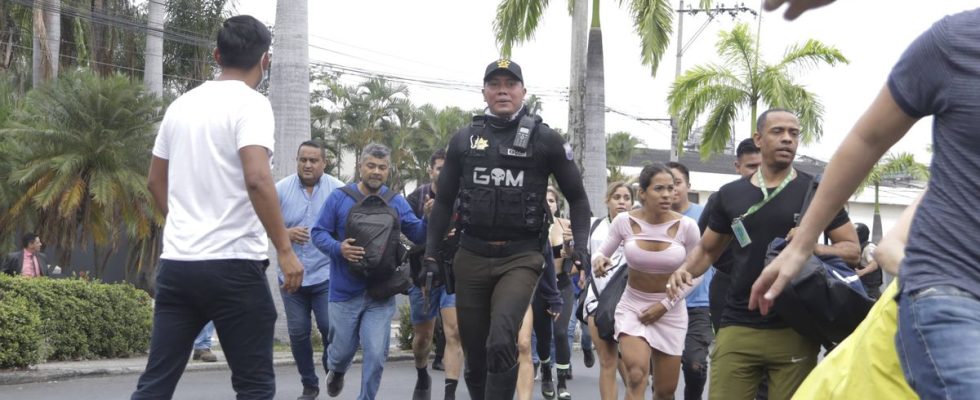Live shooting on a television set, prison guards or police officers taken hostage, schools and stores closed… For more than three days, Ecuador has been plunged, according to its president, into an “internal armed conflict” with gangs of drug traffickers. A security crisis which has already cost the lives of ten people, according to an initial assessment.
While the President of Ecuador Daniel Noboa on Tuesday ordered the “neutralization” of criminal groups involved in drug trafficking, what is the exact situation on the ground? How did it all start and in what context? What are the reactions abroad? 20 minutes make the point.
What is the situation on site?
The images broadcast on social networks, difficult to verify, give an idea of the violence on the spot and fuel the impression of chaos which is gradually taking hold in certain localities of the country. Molotov cocktail attacks, cars set on fire, random shootings at police officers, scenes of panic are increasing in the country. The Ministry of Education has ordered the temporary closure of all schools in the country. In the large port of Guayaquil, plunged into psychosis, many hotel establishments and restaurants have closed. In the capital Quito, gripped by fear, stores and shopping centers also closed prematurely.
How did it all start?
It all started on Sunday, when public enemy number 1, Adolfo Macias, alias “Fito”, the leader of the Choneros gang, with nearly 8,000 members, disappeared from Guayaquil prison. Two days later, one of the leaders of Los Lobos, another powerful drug trafficking gang, also escaped. At the same time, several mutinies and hostage-taking of guards took place in various prisons. The prison administration said 139 members of its staff were still being held hostage in five prisons across the country as of Wednesday morning.
On Tuesday afternoon, armed men burst onto the set of a public television station in Guayaquil, briefly taking journalists and channel employees hostage. No one was apparently killed or injured in the raid, and 13 attackers were arrested according to police. In the port city of Guayaquil, violence left eight dead and three injured. Two police officers were also murdered in the town of Nobol, near Guayaquil.
What is the context in the country?
Ecuador, 18 million inhabitants and once a haven of peace, is ravaged by violence after becoming the main export point for cocaine produced in neighboring Peru and Colombia. Criminal gangs, most of them simple street gangs a few years ago, have since become the bloody players in drug trafficking with international tentacles. Murders in the streets increased by 800% between 2018 and 2023, from 6 to 46 per 100,000 inhabitants. In 2023, 7,800 homicides were recorded and 220 tonnes of drugs seized. The President of the Republic, Daniel Noboa, 36, was elected in November on the promise of restoring security in the country. On August 9, a centrist presidential candidate, Fernando Villavicencio, was shot and killed in Quito.
What is the reaction of the Ecuadorian government?
The Ecuadorian president, the youngest in the country’s history, ordered the “neutralization” of all these criminal groups, of which he provided an exhaustive list, while emphasizing the need for the armed forces to act “with respect human rights “. He recognized on Tuesday “the existence of an internal armed conflict”.
Daniel Noboa declared a state of emergency on Monday throughout the country for a period of 60 days. A nighttime curfew has been introduced and the army is authorized to maintain order in the streets and prisons. On Wednesday noon, former Ecuadorian President Rafael Correa expressed his support for the measures taken by the current head of state. But it is clear that they have clearly had little effect so far. After this announcement, numerous incidents, including the kidnapping of seven police officers, were reported across the country.
How is the international community reacting?
Neighboring Peru declared a state of emergency on Tuesday evening throughout Ecuador’s border regions. An area more than 1,400 kilometers long. The country will also strengthen on-site surveillance by sending additional police and military personnel.
The head of American diplomacy for Latin America, Brian Nichols explained that the United States was “extremely concerned about the violence” and “ready to provide assistance”. Brazil, Chile, Colombia and Peru expressed their support for Ecuador. France, on Wednesday morning, asked its nationals who were considering going to Ecuador to “defer their plans as far as possible”.

